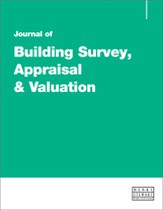Last man standing: Potential absurdities in the Party Wall etc. Act 1996
Abstract
This paper analyses the potential absurdities in the Party Wall etc. Act 1996 arising out of a recent party wall case, along with the practical implications for practising party wall surveyors. The Party Wall etc. Act 1996 came into force on 1st July, 1997 and is law in England and Wales. The Act provides a statutory mechanism for resolving disputes where the implementation of ‘notifiable’ works by one property owner (the building owner) has an impact on an adjoining property owner (the adjoining owner). Notifiable works generally comprise adjacent foundation excavations, works to repair, rebuild or modify a shared ‘party’ wall and the construction of walls at, or astride, the ‘line of junction’, being the legal boundary between the lands of two or more owners. In the event a ‘dispute’ arises between the respective property owners over the notifiable works, the Act requires both parties to appoint their own party wall surveyor, whereby the two surveyors then select a third surveyor to adjudicate any dispute they may have. Alternatively, the parties may elect to jointly appoint a single ‘agreed surveyor’ as a neutral arbiter. The agreed surveyor or the three surveyors, as the case may be, then resolve the dispute by way of an ‘award’ which is legally binding unless rendered invalid through procedural defect or where successfully appealed by either party in the county court within 14 days of service.
The full article is available to subscribers to the journal.
Author's Biography
James Mcallister is a chartered building surveyor and director of The Party Wall Consultancy (The Party Wall Consultancy is a division of The Dilapidations Consultancy Limited).
Citation
Mcallister, James (2020, June 1). Last man standing: Potential absurdities in the Party Wall etc. Act 1996. In the Journal of Building Survey, Appraisal & Valuation, Volume 9, Issue 1. https://doi.org/10.69554/JDQD2607.Publications LLP
